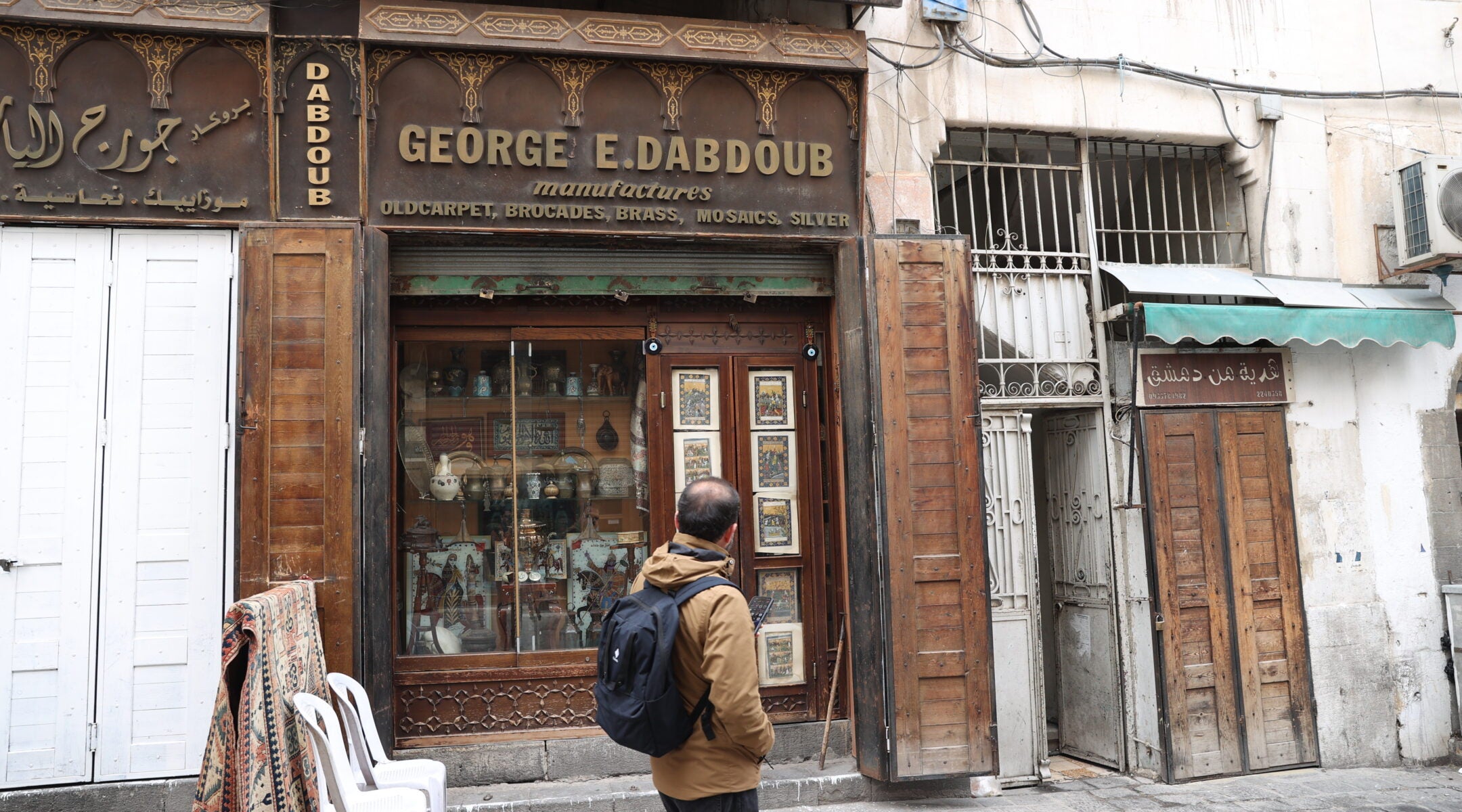DAMASCUS, Syria — “This was a Jewish home, and so was that. These were all Jewish homes,” Badriyah Mousa Shatah said as she walked through Damascus’s historic Jewish Quarter, or the “Harat al-Yahud” as it is known in Arabic.
Shatah, who was born in Damascus and has lived in the city all her life, is one of the last Jews left in the country. According to her, there are only four others who remain.
Shatah, 56, has watched the Jewish community she knew and loved crumble before her eyes. As we walked in the Jewish Quarter, she pointed to buildings she recalled from her childhood — the Jewish school, Ibn al-Mamoun, once had 850 to 950 students in attendance. There were kosher butchers, Judaica stores, and synagogues — anything and everything needed to sustain a thriving Jewish community. Now, the Jewish Quarter sits mostly empty, with locks on doors and shutters in windows a testament to those who fled.
The remarkable changes in Syria in the last nine months — the fall of its dictatorial regime, the installation of former Islamist insurgents as the new government, once unthinkable diplomacy with the United States and even Israel — have some in the Syrian Jewish diaspora optimistic about a future where Jews flourish again in Syria. But so far, such a scenario remains a distant dream. Fearing sectarian violence, Shatah agreed to guide a visitor around Harat al-Yahud only on the condition that she not be photographed.
At the community’s height, approximately 100,000 Jews were living in Syria, but after Israel’s formation in 1948, a set of draconian measures was implemented by the then-President of Syria, Shukri al-Quwatli. Jewish residents were stripped of their civil rights, and the death penalty was imposed for any Syrian who attempted to leave for Israel. Syria is still technically at war with Israel, as the Agreement on Disengagement signed following the Yom Kippur War is not a peace agreement, only an extension of a pre-existing ceasefire.
Syrian Jews weren’t permitted to leave the country without posting a $6,000 bond and had their assets frozen for fear that they would sell their homes and emigrate. At the end of the 20th century, there were a few thousand Jews left living in Syria — others had fled illegally over the years with assistance from the international Jewish community. Most would leave the country for good in 1992, after Hafez al-Assad agreed to grant exit permits to Jews who wished to emigrate.
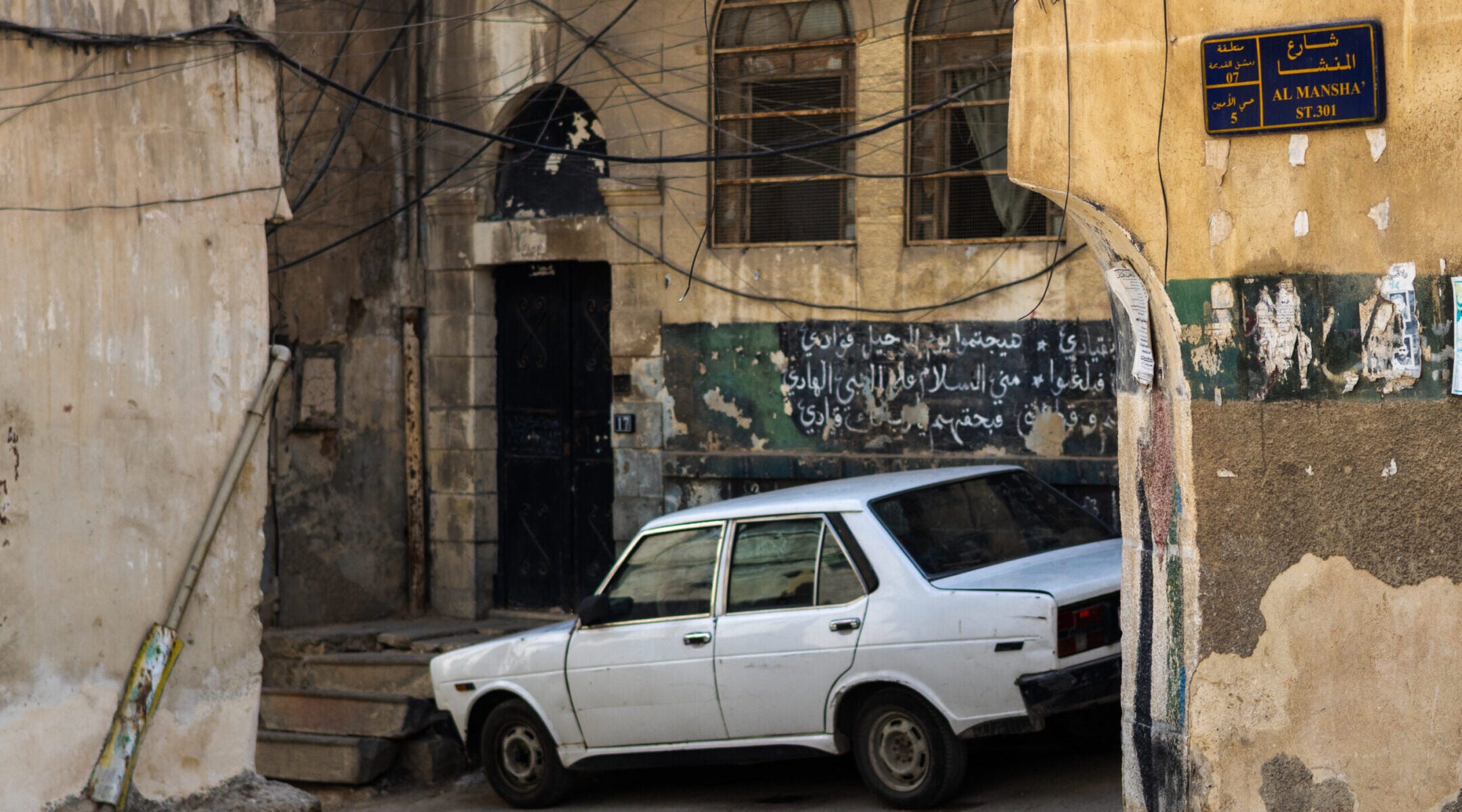
Damascus’ Jewish Quarter, as seen in August 2025, betrays signs of the local exodus and decade of civil war. (Theia Chatelle)
Shatah chose to stay, and when asked why, she said in Arabic, “Ana hmar,” or “I’m an idiot.”
After all but a few dozen Jews left the country, Jewish life in Damascus came to a standstill. “There hasn’t been prayer here in at least 10 years. We haven’t had a minyan,” Shatah said, referring to the quorum of 10 Jews required to say some prayers.
After the outbreak of the Syrian Civil War in 2011, Shatah attempted to flee to the United States, where her brother lives. But when the U.S. Embassy closed, she was left without any option but to stay. Shatah would live through a war that would claim the lives of 620,000 Syrians and ended only in December after Hayat Tahrir al-Sham, an Islamist faction of the Syrian opposition, overthrew the al-Assad regime.
Since then, Israel has been in high-level talks with the new Syrian government about a potential security agreement between the two countries, even as the Israeli army has installed itself in a border region and targeted Hezbollah and Turkish installations within Syria. The talks have been stoked by encouragement from U.S. President Donald Trump, who has sought to end longstanding conflicts around the globe since returning to office in January.
“When it comes to the Israeli government, the one thing is that they obey President Trump. So the Israeli government has no other choice but to obey and start talking with the Syrians,” said Eyal Zisser, vice rector of Tel Aviv University and an expert on the modern politics of Syria. “It’s in the interest of both sides, especially the Syrians, but also Israel. He [al-Sharaa] needs stability. The last thing he needs is a war.”
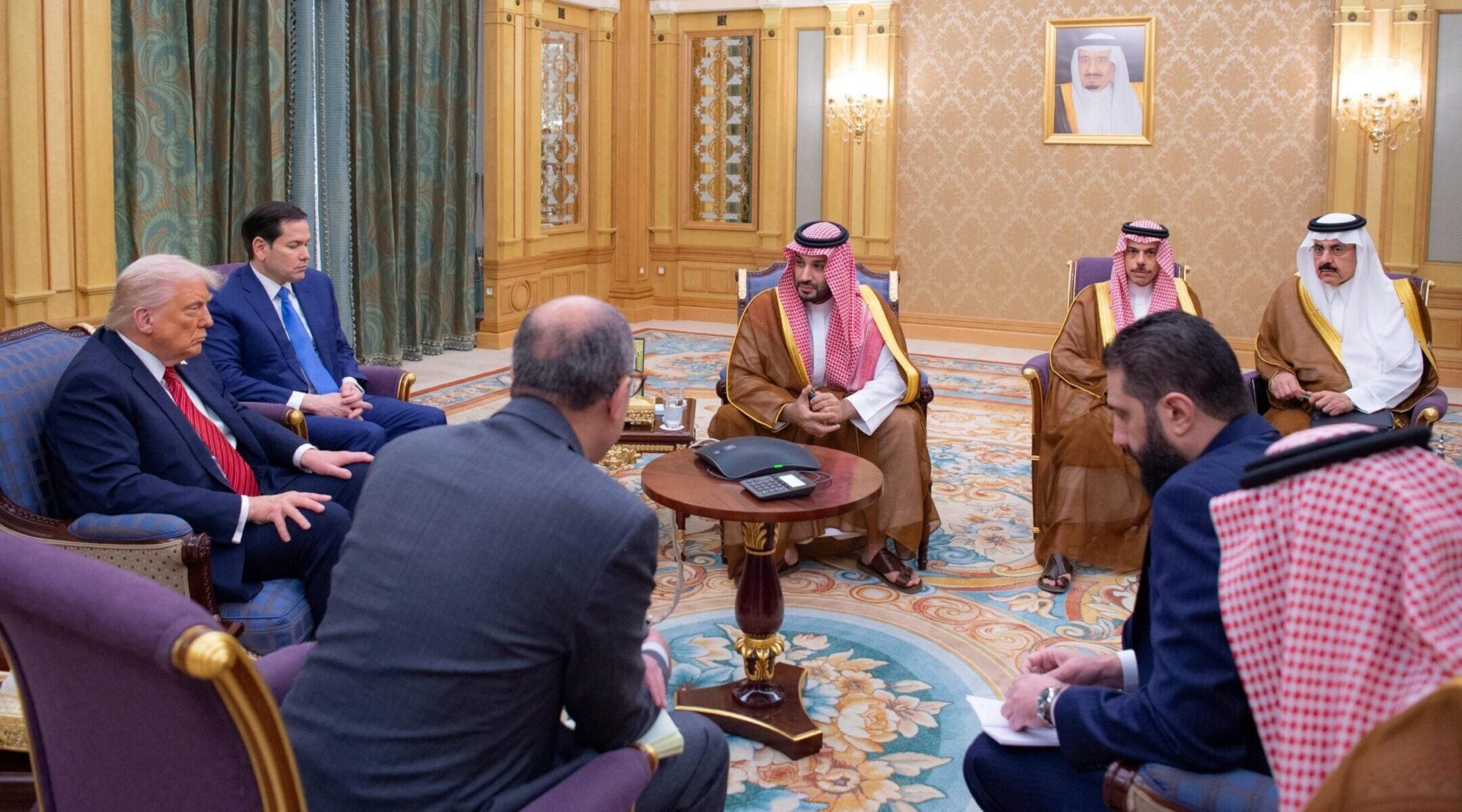
U.S. President Donald Trump (1st L), Saudi Crown Prince and Prime Minister Mohammed bin Salman Al Saud (C) and Syrian interim leader Ahmed al-Sharaa (R, front) attend a meeting in Riyadh, Saudi Arabia, on May 14, 2025. (Saudi Press Agency/Handout via Xinhua)
In February, shortly after the end of the Syrian civil war, the Syria Emergency Task Force helped to facilitate a trip to Syria for the Syrian-Jewish community, garnering hopeful headlines as they visited sites members of the delegation had not seen for decades. But despite all of the hope since the end of the war, life in Damascus is still fraught with difficulty. When I visited in August, it was clear that both the city itself and all who live there are still in the process of recovering from 14 years of violence.
“This is all new. It will take time,” said Henry Hamra, who fled Damascus with his father in 1992 and joined the SETF trip. Hamra and many in the Syrian Jewish community living abroad are hopeful that the fate of the Jewish community in Damascus will improve, even if those who fled choose not to return.
Shatah, however, is full of concern. “We don’t leave the house. We stay home because there are no holiday ceremonies, no synagogue, no open reading, and no prayer,” she said, reflecting on her life in Syria without her extended family or any meaningful Jewish community. “We are trapped.”
Shateh is trained as an engineer and once owned a jewelry store in the city. But she hasn’t lived in the Jewish Quarter for years — she fled during the years of fighting. It was clear that revisiting the sites of her childhood was difficult for her.
As we walked down the quarter’s narrow passageways, Shatah whispered as she described how, under the rule of Hafez and then Bashar al-Assad, the homes of Jews who left Syria were transferred to non-Jewish residents. In other cases, knowing that the Jews who left likely wouldn’t return, residents began squatting in their homes after they cut the locks.
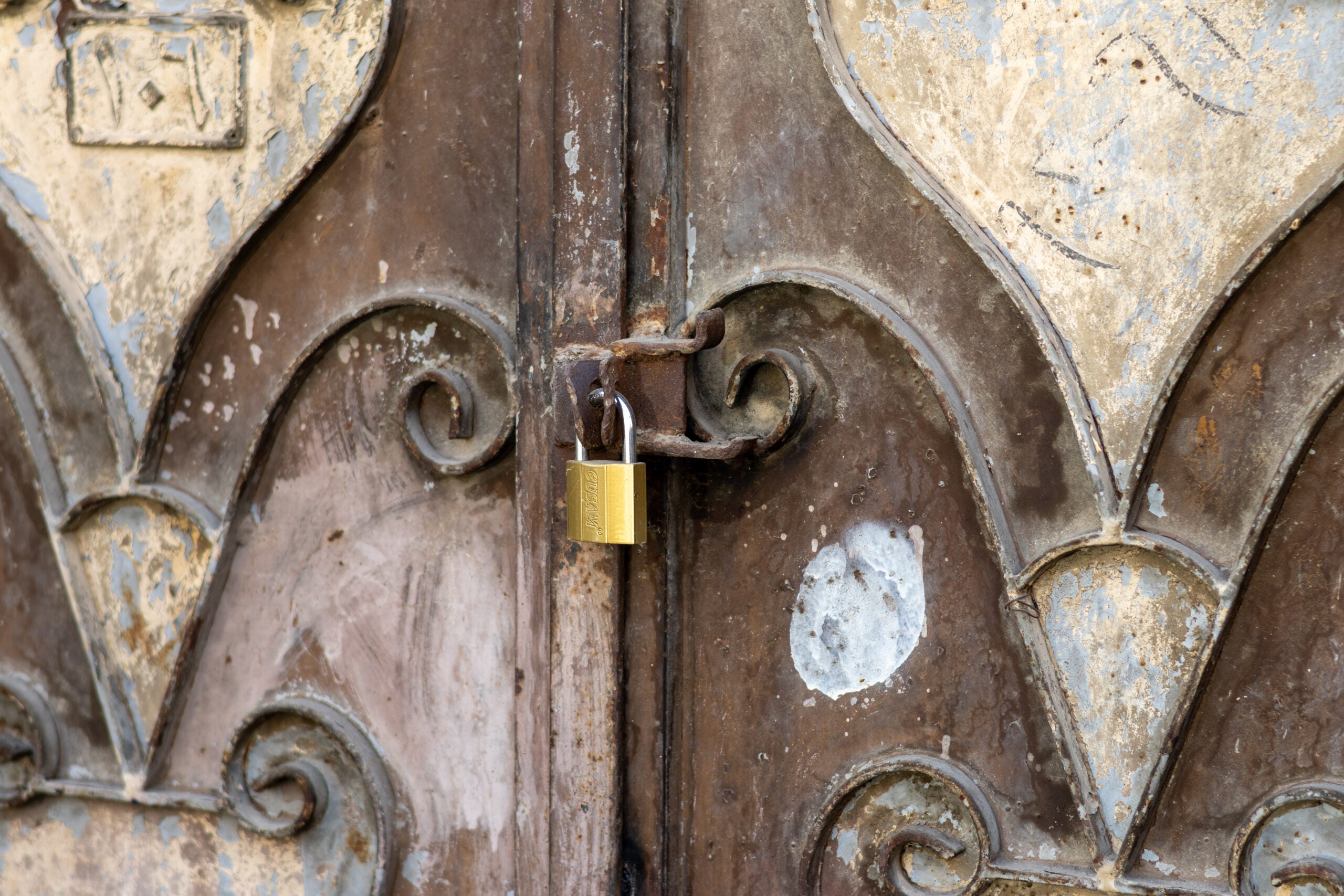
Many buildings in the old Jewish Quarter of Damascus were locked by Jews who fled and hoped to return, as seen in August 2025. (Theia Chatelle)
The caretaking of Jewish historical sites in Damascus has been left to a variety of entities. The keys to some of the buildings are with the Syrian General Security Service in an attempt to deter theft, and the keys to many residents’ homes and other historical sites have been left with the few Jewish residents who remain, or in other cases, their Muslim neighbors. We weren’t able to enter the Ibn al-Mamoun School during our visit to the Jewish Quarter, as Shatah said, “It’s been a week that I’ve been asking for the key — when I said to him [one of the Jewish residents], I asked him for the key — he didn’t come, and he’s afraid to come at this hour.”
Shatah told me that she wants to leave, “as fast as I can.” But she is still looking for a way out. “I wanted to travel but they don’t accept us,” she said of the United States.
Without a visa or political asylum, it appears that there won’t be a way for Shatah to reunite with her family in the short term.
On the other hand, as Hamra told JTA, the Syrian government, led by Ahmad al-Sharaa, formerly the Head of the al-Nusra Front, has shown willingness to constructively engage with efforts by the Syrian-Jewish community to document their property that has been lost and to protect the Jewish historical sites that are still standing. The issue is personal for Hamra: He said that when he returned to Damascus to visit his childhood home for the first time since 1992, he found that it had a new occupant.
“The neighbor went inside my house,” he said. “They broke the wall on this end to get in.”
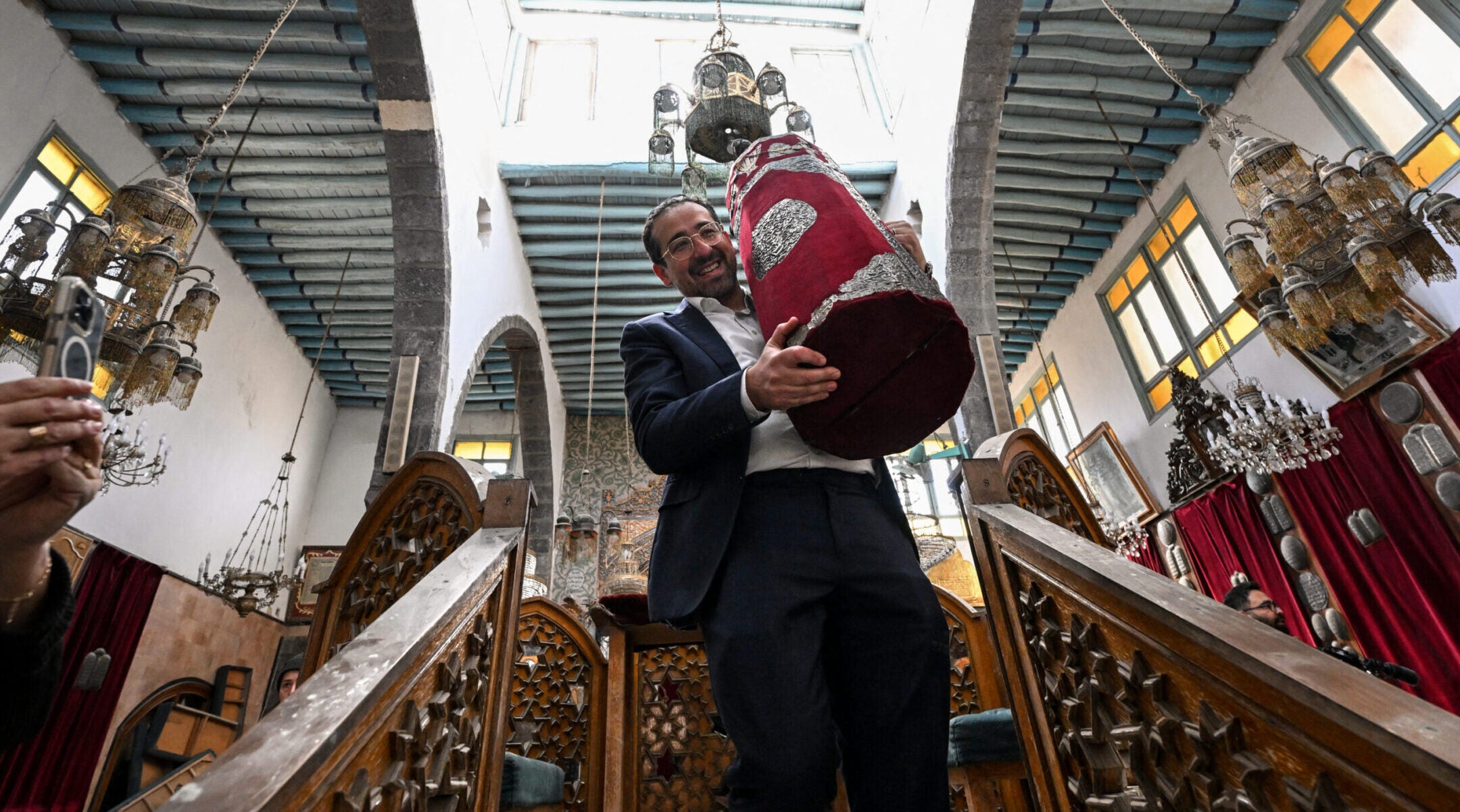
Henry Hamra holds a Torah as he tours the Ifrange Synagogue in the Jewish quarter in Old Damascus’ Bab Sharqi neighborhood on Feb. 18, 2025. (Louai Beshara/AFP via Getty Images)
There are countless Jewish historical sites in the city, and Hamra hopes that, one day, with the help of the international Jewish community, they can be restored to what they once were. Doing so will be difficult and will require investment from various stakeholders, not just in the Jewish community but from the Syrian government — trading on relationships Hamra is already starting to build. He, his father and others met with Moussa al-Omar, a high-level advisor in the Syrian government, during the February visit. “He said that if you have any problems with people living in your homes, we will help you get your property back,” Hamra recounted.
But Hamra worries that the issue will get worse as Syrians who were forced to flee Damascus during the war return to the city.
“There’s a lot of demand for housing in the Old City of Damascus. I don’t know what it’s going to be; a lot of people are moving in,” he said. “We’re trying to get everything under control, because if we don’t control it. It’ll be chaos over there.”
Shatah said she and the other Jews left in the city have grown fearful in recent months, in the wake of rising sectarian violence. In June, at least 30 were killed after a Saraya Ansar al-Sunna gunman opened fire and detonated a suicide vest at the Greek Orthodox Mar Elias Church in Damascus. Just weeks later, fighting would break out in as-Suwayda between Druze and Bedouin militias, leading to hundreds of deaths and a siege on the city that still has not been fully lifted.
Zisser said he believes it is unlikely that the Jewish community in Damascus would become a target of the Syrian government, but he didn’t rule out attacks from non-state actors. “ If you read the new Syrian constitution, it speaks of monotheistic religions, which means Judaism, Christianity, and Islam. The Jews have nothing to be afraid of,” he said. “But of course, when there is sectarianism, everyone lives in fear.”
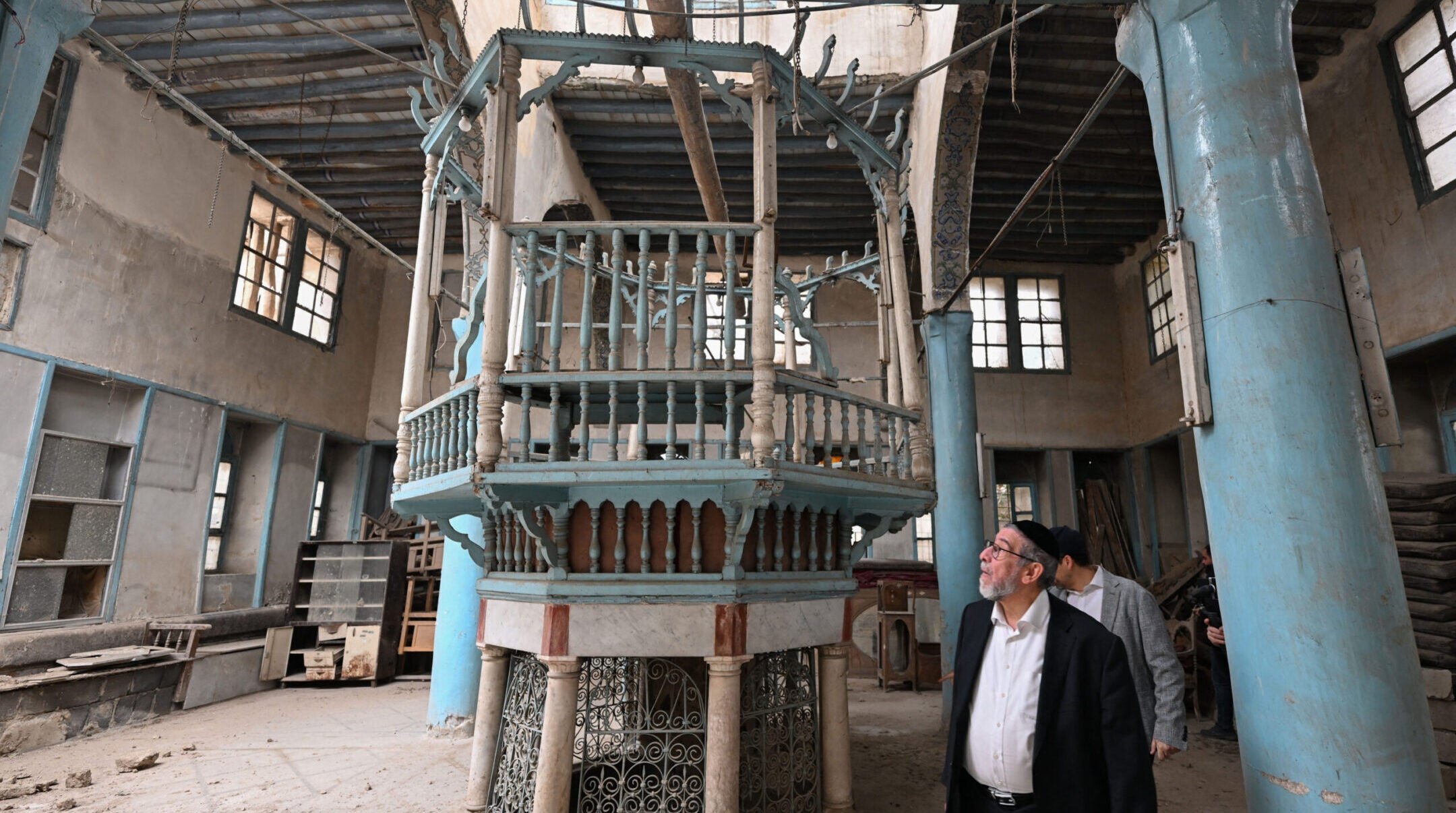
Syrian U.S.-based rabbi Youssef Hamra tours the Ifrange Synagogue in the Jewish quarter of Damascus’ Bab Sharqi district, on Feb. 19, 2025. (Louai Beshara/AFP via Getty Images)
For now, the state of Syrian Jewry contains a paradox. The Jewish residents who still live in Damascus, the five of them, would like to flee, but those living in the United States who were forced to flee so long ago, are excited about the prospect of a return, even if temporary.
“A lot of people want to go and see what’s going on,” Hamra said of the Syrian-Jewish community in Brooklyn. So much has been lost, but there is also much that can be preserved, and signs that the new government could be a partner in that effort.
“We should give them more time. It’s too early to tell,” Hamra said of the Syrian government.
But Shatah, meanwhile, is eager to leave. She knows that the others who remain are elderly and soon there won’t be any Jews living in her city, which for all of the optimism abroad remains littered with reminders of the families who fled and the Jewish history that has little prospect of being revived in the present.
“If others want to come back, they can,” Shatah said. “But life is hard here.”
JTA has documented Jewish history in real-time for over a century. Keep our journalism strong by joining us in supporting independent, award-winning reporting.
